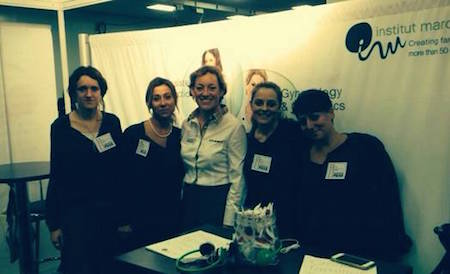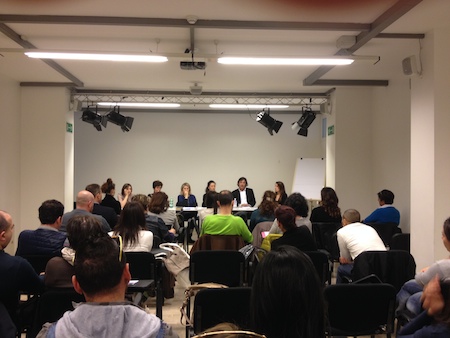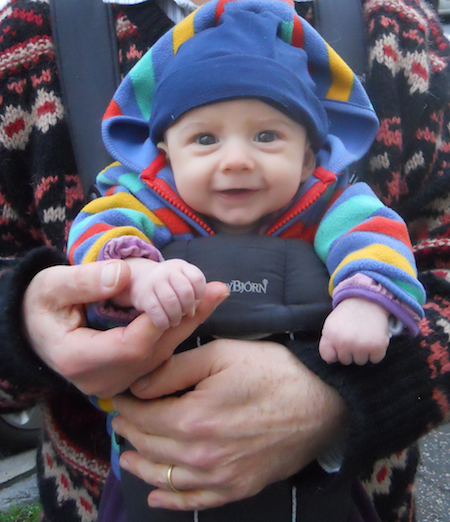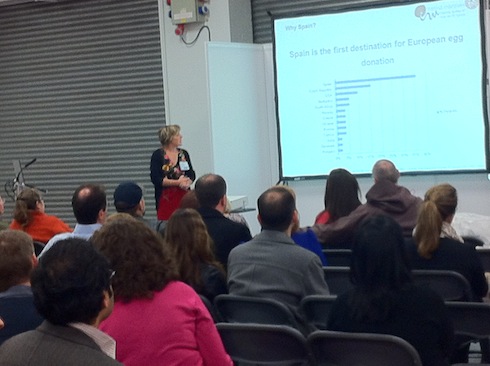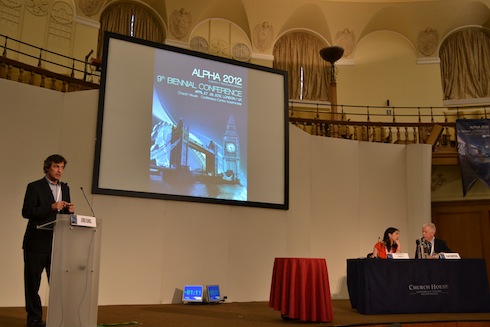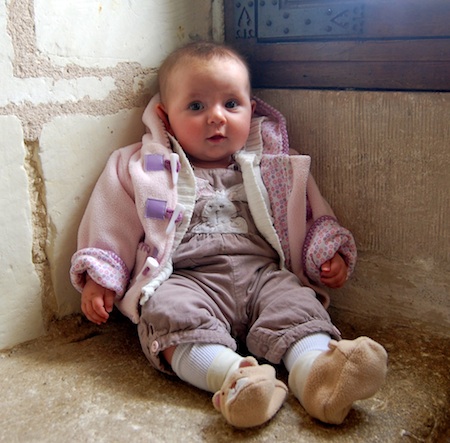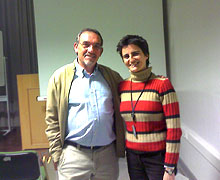News previous years
Our new clinic in Milan
(24-11-2014)
Institut Marquès has opened a clinic in Milan with the aim of providing the Italian couples with a much more comfortable process in the treatment of their infertility.
The new center, located in the center of the city, was inaugurated on November 24th.
Patients can attend medical visits with our team of specialists there without having to go to Barcelona, as well as undergo all necessary tests for their treatment.
Our new headquarters in Milan adds to those in London and Dublin and represents another step in our commitment to be close to the international patients who come to us to help them create a family.

Egg donors. Who are they? How are they chosen?
(1-11-2014)
Once more we have been participating at the Fertility Show that took place this weekend in London.
Our specialist Dr. Victoria Walker was giving a seminar entitled Egg donors. Who are they? How are they chosen?
During the talk, Dr. Walker discussed about egg donation in Spain, comparing it with donation in the UK: “Spanish law establishes that egg donation must be anonymous, and therefore only the recipient’s doctor knows who her donor was. Donors are young, altruistic girls who want to help other women and many are themselves helped to finish their studies by the financial compensation that is given, Dr. Walker explained.
According to the ESHRE task force, Spain has more oocyte donors than any other European country, but does not offer the highest amount of reimbursement, and does not have the highest percentage of financially motivated donors when compared with donors in other European countries.
Find more about Malou and why she decided to become an egg donor in Institut Marques.
Dr. Velilla leads the Practicum organized by ASEBIR about embryo biopsy.
(1-10-2014)
The success of embryo biopsy mainly depends on the fact that the technique is performed by expert hands.
This week, the director of our Reproductive Biology Service, Dr. Esther Velilla, leads a theoretical and practical course in Cáceres about biopsy and isolation of blastomeres, organized by ASEBIR (Study Association for Reproductive Biology).
What is the embryo biopsy and how to perform it? Read more.
We are attending the World Congress WOOSP, held in Jaipur, India.
(8-8-2014)
The Director of our Reproductive Biology Unit, Dr. Esther Velilla, presents this weekend at the 2nd World Congress On Ovarian Stimulation Ovulation Induction & Protocols, a paper on egg donation in a globalized world. She will address the causes and consequences of the reproductive tourism boom or “cross border reproductive care” and how the reality of egg donation has changed over recent years. Our team has been invited to this meeting as a group of worldwide reference in this technique, increasingly used in assisted reproduction.
The taboo of infertility viewed by our patients.
(30-6-2014)
At the congress of the European Society of Human Reproduction (ESHRE) held this week in Munich, our team presents, among other works, a comparative analysis of the social consideration assisted reproduction treatments have in different countries. According to the study, while 70% of Spanish and British believe that infertility is socially accepted in their country, in the case of Italian patients this percentage drops to 30%. The differences are due to religious and cultural conditioning factors, as well as to the legislative framework of each country.
Latest data on endometrial thickness and chance of pregnancy
(2-6-2014)
One of the most frequent questions when a reproduction treatment is done is about the measure that must reach the endometrium, the lining of the uterus that allows receiving and admitting the embryo and that makes that there is a good implantation and that the pregnancy is achieved.
This query is repeated in the fertility forums and even among physicians is frequent the discussion about the millimeters that needs to have the endometrium so that it can performed the embryo transfer with guaranteed success.
According to a study presented by the Institut Marquès in the Spanish Fertility Society congress which involved the review of 5026 cases, the endometrial thickness is not a decisive factor on the chances of implantation, or miscarriage or pregnancy on condition that it’s greater than 5 mm. In this study were analyzed the cases of thousands of women that, when they received the embryos, showed a highly variable endometrial thickness (from 5 to 12 mm) and it was found that this factor did not change their chances of success, ie, they equally became pregnant if the transfer was carried out with a 5mm endometrium than with a 12 one.
Spanish Society of Fertility Congress Barcelona 2014
(29-05-2014)
Our team presents nine research papers in the Spanish Fertility Society Congress that will be held in Barcelona from 29th to 31st May.
The works that stand out among the selected are the ones concerning the incorporation of music in our incubators, the stunning images of embryos after transferring them to the uterus, an analysis of the profile of people who adopt embryos or the emotional response of our patients while observing the development of their embryos through their smartphones.
We took part in a new conference organized by the Italian Association Strada per un sogno
(06-04-2014)
Dr. Jordi Suñol, the scientific director of Institute Marquès, participated last Sunday in Milan in a meeting of women with fertility problems organized by the association Strada per un sogno, in collaboration with AENDO (Italian Association for pelvic pain and endometriosis). The topics covered were female pathologies which cause infertility, as well as low ovarian reserve and low endometrial response to the hormonal treatment.
Our Patient Assistance Service, awarded
(20-03-2014)
Institut Marques was awarded a top industry patient service award this week, based on feedback from Whatclinic.com visitors over a twelve month period.
Whatclinic.com is a global clinic comparison site which lists over 100.000 clinics from around the world.
Visitors rated our clinic based on how well we treated them, how quickly they were contacted and seen, and how happy they were with the treatment. We are proud to receive this award that enables us to keep on moving on the excellence road to which we are committed. If you want to share your experience with us, please click here.
We take part in the conference organized by the Italian association Strada per un sogno
(17-02-2014)
Dr. Jordi Suñol, Institut Marquès’ Scientific Director, participated this weekend in the meeting organized by the association Strada per un sogno, one of the most important in Italy, dedicated to supporting and informing people with fertility problems.
Under the title of “Hidden Saint Valentine, love conditioned by Assisted Reproduction’, our scientific director spoke about the emotional rollercoaster that accompanies fertility treatments and other aspects related to IVF with egg donation.
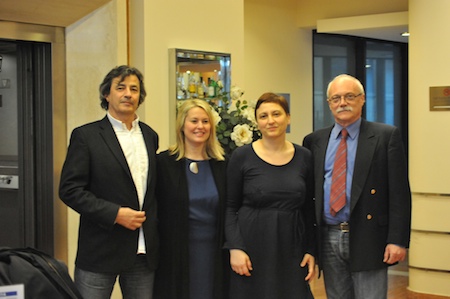
We have been awarded with the ASEBIR prize for the best Poster 2013
(25-11-2013)
Our biologists’ work and the constant technological innovations such as the use of the Embryoscope and the application of PGD of 24 chromosomes in our laboratories, have been recognised with the award for the ‘Best Poster 2013’ in the VII ASEBIR National Congress. The work presented by our Genetics Laboratory team is called: Differential Morphokinetic between euploid and aneuploid embryos.
Moreover, the work of our IVF Laboratory team, Predictive morphokinetics markers on good quality blastocysts formation has been a finalist for the same prize.
See Genetics Laboratory Poster.
We are attending the ASEBIR congress (Spanish Association of Reproductive Biology), that takes place in Sevilla from next Wednesday
(18-11-2013)
In this important meeting we are presenting some works related to sperm vitrification, an alternative technique to freezing that avoids the formation of ice crystals and uses sucrose as a natural cryoprotector.
Dr. Esther Velilla, Director of our Reproductive Biology Service, will talk about the benefits of this technique, that allows us to improve sperm mobility after cryopreservation. Vitrification is specially recommended for oncology patients who freeze sperm before undergoing chemotherapy in order to become parents in the future.
Record of visits in our stand at the Fertility Show
(02-11-2013)
This year we have presented our musical IVF and other technological advances at the Fertility Show in London. On Saturday morning Dr. Walker held a seminar about egg donors abroad with a large number of visitors. Also Santi Costa, our International manager, Carmen Caló, Andreina Collu, Gwen Navarro and Sara Martínez were representing our centre at the meeting.
The first IVF baby to be created in the presence of music is born in the UK
(30-10-2013)
Freddie is the first British IVF first baby exposed to music in our lab at the time of his fertilisation. His parents came to us after a number of miscarriages and a failed cycle of IVF in the UK. Earlier this year, our embryologists unveiled groundbreaking research, which showed that playing music during IVF fertilisation increased the chances of success by almost 5%.
Couples in the UK and in 16 other countries have had successful IVF treatment with the help of this innovation. Read more.
First British baby born using musical IVF
Informative conference for the World’s Breast Cancer Day
(16-10-2013)
On Saturday 16th of October, coinciding with the World’s Breast Cancer Day, our team attended the informative conference organized by the CIMA Sanitas Hospital and the Association against breast cancer AMYCO, held in our auditorium. The director of our breast cancer unit, Dr. Alex Garcia Faura, addressed the surgical treatment of breast tumors, accompanied by other specialists in oncology, nursing, psychology, nutrition, aesthetic and legal advice, that reported to the interested party. Dr. Garcia Faura recalled that, fortunately, nowadays more than 90% of breast cancer cases are curable and that the annual gynaecological examination is the key to early detection of the disease.
Today we are attending the International Congress of Assisted Reproduction that takes place in Goa, India
(07-10-2013)
The Director of the Reproductive Biology Unit at Institut Marquès, Dr. Esther Velilla, is presenting two papers in this congress, attended by specialists from all over the world. Today she will talk about the use of PGD (Preimplantation Genetic Diagnosis) to avoid complications during reproductive treatments. Tomorrow she will be offering the attendees her vision about what the Embryoscope is allowing us to discover since this last generation embryo incubator first started to be used.
Music increases the chances of fertilisation
(09-07-2013)
Micro musical vibrations increase the chances of fertilisation in the laboratory. This is the main conclusion of the study entitled “Impact of exposure to music during in vitro culture on embryo development” that our team has presented at the annual meeting of the European Society of Human Reproduction (ESHRE) held from 7 to 10th July in London.
Working in collaboration with a sound engineering consultancy, Institut Marquès has designed a system capable of playing music inside the incubator 24 hours a day. The results show that those eggs cultured with music improve their fertilisation rate by 4, 8%. Read press release. Read articles on press
Institut Marquès’ team of embryologists attend the ESHRE Annual Meeting in London
(04-07-2013)
Our team of biologists will be at the European Society for Human Reproduction (ESHRE), which takes place from July 7th – 10th in London. Our specialists will train everyone interested on the new vitifrication and devitrification method by Dr. Kuwayama at the booth 62 on Monday July 8th from 15h to 16h and Tuesday 9th and Wednesday10th July 10th from 10am to 11 am.
Our Reproduction team continues to grow
(10-06-2013)
During the last few weeks, our Infertility Unit was welcomed Dr. Priscilla Andrade, Dr. Melissa Brain, and Medical Assistant Silvia Pittarella.
Thanks to our team, formed by 40 doctors and embryologists and 18 Patient and Medical Assistants, we can continue to offer the excellence and medical care that each and one of our patients deserve in the road to accomplish their dream of creating a family.
The safety of the embryos is of first importance.
(22-05-2013)
Knowing that the embryos are well protected is key to the tranquility of our patients. The IVF laboratories of Institut Marques, ISO 9001 certified, have a special security system to protect the integrity of our little patients. This device is equipped with an alarm system connected to mobile phones warning about any possible changes in the storage conditions of the embryos and allows us to avoid possible damage.
Our labs also have a telemetry program that permanently guarantees the necessary level of liquid nitrogen for the suitable maintenance of the embryos and this supply is automatically replenished whenever necessary by remote control.
New online seminars in English, Spanish, French and Italian.
Once more, we begin a cycle of online seminars so you can be informed about everything related to achieving motherhood while comfortably sitting on your couch.
For the Italian speakers, Dr. Federica Moffa will inform about egg donation and when the technique is recommended by doctors, how the donors are selected and matched, what are the pregnancy rates, and what one must know before starting treatment.
Other online seminars we will offer are:
- Dra. Marisa López Teijón: Cómo mejorar tus posibilidades de embarazo. 20 marzo. (Spanish).
- Dr. Victoria Walker: How to improve your pregnancy rates. April 10th. (English)
- Dr. Jordi Suñol: Comment faire pour améliorer vos chances de grossesse avec FIV. 17 avril (Français)
Institut Marqués at the NISIG Donor Conception Meeting in Dublin, 23rd February 2013
(17-02-2013)
Dr. Jordi Suñol, our Scientific Director, participated in the NISIG Donor Conception Meeting, which took place on the 23rd February in Dublin. This support meeting is thought for those considering or undergoing donor conception. For further information, visit: http://nisig.com/supportmeetings/
Institut Marquès participates in the Fertility Show
(3-11-2012)
Dr. Victoria Walker gives a seminar about egg donation abroad at the “Fertility Show”,an event that is only held in London once a year. It gathers the best worldwide experts in assisted reproduction and all women and couples who want to undergo a reproduction treatment and don’t know how to start.
During the Fertility Show, women and couples learn all they need to know to become pregnant, a patient’s experience within the emotional rollercoaster infertility entails, and how to manage a couple’s relationship having infertility issues, amongst many other topics. Around 4,000 people are expected to attend the Show this year.
Our study on endometrial movements presented at the Congress of the American Society for Reproductive Medicine.
(20-10-2012)
The ASRM (American Society for Reproductive Medicine) Congress takes place this week in San Diego, and our scientific director Dr. Jordi Suñol is participating in it.
The fertility expert and president of the Institute for Human Reproduction in Chigago, Dr. Ilan Tur-Kaspa, is presenting the study performed by Institut Marquès on the movements of the uterus after embryo transfer, which was awarded in the Alpha Conference that took place in London recently. On the picture we can see Dr. Suñol the day of the presentation.
We celebrate 2500 cases of PGD with news about its usefulness in increasing the chances of pregnancy
(28-09-2012)
Having performed 2,500 PGDs, the Genetics team at Institut Marquès settles as an internationalreference in the area of embryonic genetic analysis.
According to a study conducted by the Pacific Reproductive Center in California, which was published in Molecular Cytogenetics, PGD significantly increases the chances of pregnancy in infertile patients without risk of chromosomal alterations, decreases rates of abortion, and is especially useful for single embryo transfers, SET.
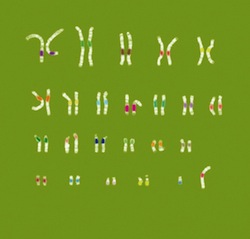
We train European embryologists on specialized techniques
(23-08-2012)
Institut Marquès gives a new training programme for biologists who want to specialize in vitrification and micromanipulation techniques.
During the past months, biologists from Italy, Portugal, India, and Russia have visited us, and have learned techniques such as IMSI or embryo biopsy for preimplantational genetic diagnose with our embryologists to later develop them in their countries and, thus, improve their success rates with the latest advances in reproductive technology.
This programme is a step further in our commitment to teach Medicine and Reproductive Biology throughout the whole training process, since High School and up until College, students and postgraduates visit us and stay and our biologists teach outstanding masters and international workshops.
Embryo adoption: Over 500 babies born in 28 countries
(02-07-2012)
This week we present our Embryo Adoption Programme’s 500 births in 28 different countries at the ESHRE Congress, which is taking place in Istambul.
Click here and learn about Sarah’s story, a beautiful girl bron from a frozen embryo. To read about how the initiative emerged visit our Fertility Blog.
For the first time, patients can observe their embryo’s development from home
(16-05-2012)
Coinciding with the SEF(Spanish Fertility Society) Congress 2012, Institut Marquès presents an innovative system for patients who are undergoing an In Vitro Fertilisation Cycle to observe, through the Internet, the development of their embryos from their homes before these are transfered to the woman’s uterus. Thus, they can “enter” the In Vitro Fertilisation laboratory from their home or any other place to watch their embryos like embryologists do. Read more.
Learn how the uterus moves the embryos
(27-04-2012)
A new study that we present this weekend at the Alpha Conference in London reveals, for the first time, images of the uterus’ activity when receiving the embryos from an In Vitro Fertilisation.
In the video we can observe how the endometrial movements allow the embryos to get placed, regardless of the spot in which the gynecologists deposits them initially. This finding discloses that it isn’t necessary to keep rest after the embryo transfer and reduces a considerable amount of stress from our patients.Continue reading.
Around half of our patients from the UK undergoing reproduction treatments prefer having twins
(16-04-2012)
We have carried out a survey on about one thousand couples and discovered that around half of our English patients would rather have twins than an only child. Many brave people can still be found during times of crisis. Read More.
More about twins in www.fertility-experiences.com
Zita West visits Institut Marquès
(28-03-2012)
Zita West has now been involved in fertility and pregnancy for over 25 years, as a midwife, nutritional advisor, acupuncturist, author and consultant. Over that time, thousands of couples have come to her for advice on how to get into the best possible shape for all the vital stages of preconception, pregnancy and birth. She came to visit our clinic and facilities on March 2012.
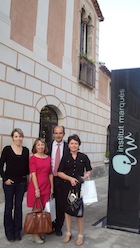
Motherhood after the age of 40: The Penelope Syndrome
(19-03-2012)
Dr. Moffa has participated in the congress on the Penelope Syndrome which has been held in Torino, with a speech about egg donation.
The Penelope Syndrome refers to those women who delay motherhood and reach an age where they need the eggs of a donor to become a mother.
We have received the What Clinic 2011 Award for our patient care
(09-02-2012)
We are aware that an infertility treatment must be accompanied by an especially close and delicate care from the very beginnig. Thus, we feel proud that associations and patients value the personalized attention we offer throughout the whole process.
It is one of the top priorities with which we work and the one that in every visit, phone call or email inspires the 50 Reproduction specialists, embriologists, and Patient and Medical Assistants that compose our medical team.
The Spanish Fertility Society acknowledges Institut Marquès as a center for the preservation of fertility
(10-01-2012)
The Spanish Fertility Society has recognized Institut Marquès as being one of the centers with a programme destined to the preservation of fertility in women with cancer or young women who want to freeze their eggs to postpone maternity for the future.
Institut Marquès counts with the experienced Dr. Federica Moffa, who has just published anarticle in Hindawi Publishing Corporation about the effects of cancer on fertility, vitrification and ovary tissue transplant.
We form European and Canadian biologists at the courses organized by CEM
(15-11-2011)
Our Center for Embryo Medicine continues to form biologists by conducting courses throughout the whole year.
The CEM Workshops are entirely practical sessions aimed at reproductive biology professionals who can acquire theoretical and practical knowledge for the use of this methodology.
This week, CEM offers a workshop on micromanipulation techniques and the IV embryo biopsy workshop.
Institut Marquès at the American Society for Reproductive Medicine Congress
(17-10-2011)
We’re participating in ASRM’s 67th Annual Meeting, that is being held this week in Florida and where experts from around the world are coming together. On this important event, our specialists Dr. Braulio Peramo and Dr. Esther Velilla are presenting, amongst other studies, the effectiveness of the FISH technique when applied to the PGD of all chromosomes in the embryo.
Spain is the world-wide country where more cases of PGD have been performed as a complementary technique to improve the chance of pregnancy.
The ASEBIR Congress gets Reproduction-specialized biologists together in Girona
(06-10-2011)
Institut Marquès presents its results on the use of the polarizer as an advanced technique for the observation of the eggs.
The polarizer is a new technology, available in our laboratory, that allows us to observe the most important structures of the egg, such as the meiotic spindle or the zona pellucida. It also allows us to avoid damaging these throughout the process of fertilisation, thereby improving the chances of pregnancy.
In the study presented at the conference, Institut Marquès’ Reproductive Biology team values the results obtained with this technique when applied to egg donationtreatments. According to Arantza Farreras, IVF biologist, “in a 97% of our donors’ oocytes we can observe the meiotic spindle, so we can carry out the fertilisation of the egg without damaging it.”
Today at the World Congress of Endometriosis
(06-09-2011)
Today in the World Congress of Endometriosis, Dr. Suñol is presenting a study by Institut Marquès that shows that the use of Assisted Reproductive Techniques optimizes the pregnancy outcome in patients with mild or severe endometriosis.
According to Dr. Jordi Suñol, “with endometriosis it’s especially important to analyze the male’s semen and study the FISH and DNA fragmentation. Thanks to the years of investigation Institut Marques has invested in this subject, many women with this problem today have the same opportunity to become a mother than other women. “
Up to 1300 specialists on different disciplines are attending the World Congress of Endometriosis that will last until tomorrow..
Institut Marquès widens its international medical team with the incorporation of the prestigious italian Dr. Federica Moffa
(28-07-2011)
Institut Marquès widens its international medical team with the incorporation of the prestigious italian Dr. Federica Moffa. Dr. Moffa is an outstanding specialist in assisted reproduction renounced in Europe, as well as being one of the top world-wide experts in ovarian tissue vitrification.
Poor sperm quality is related to the transmission of toxic substances during pregnancy and lactation
(08-07-2011)
Institut Marquès yesterday presented a study warning that the pollutants gathered in mothers can alter the development of the embryo’s testicles.
Galicia, the autonomous community with best sperm quality, shows lower levels of toxics in maternal milk than Catalonia, where women’s milk presents up to four times more toxics than galicians’.
Institut Marquès will be presenting tomorrow the results obtained from a study on toxics in maternal milk and sperm quality
(06-07-2011)
Institut Marquès will be presenting tomorrow the results obtained from a study on toxics in maternal milk and sperm quality.
Why is masculine fertility decreasing?
For obvious reasons woman are attracted to sperm but in my case, dedicating myself to studying infertility it is a more healthy attraction. This was the reason why, for 10 years I have pushed my infertility team to investigate male infertility.
Institut Marquès has been studying the quality of Spanish male sperm since 2003, first in Tarragona (a study presented at the SEF (spanish fertility society) congress), and then in Barcelona and Corunna (study published in Reproductive Biomedicine) and finally in the whole country (I national study of youth’s sperm quality published in Andrologia and in collaboration with 62 reproduction centers).
We are proud that we have contributed in refuting previous misconceptions; (stress, tight trousers, alcohol, etc) they are all myths, the underlying cause are chemical toxics. Industrial contamination is playing a key role in this game.
These toxics are synthesized chemical products made by man used regularly in industry, agriculture and at home. They are called endocrine disruptors, a long list of compounds that in the female organism act as estrogens. They are very resistant to biodegradation, and can be found in our diet and in the atmosphere, they gather in our organism, especially in fats and we are not designed to eliminate them.
Our first contact with these chemicals is at the embryonic stage, passed through the blood and placenta from the mother. The type and level of toxics transmitted depends on the level of toxics which the mother has accumulated.
Currently there is debates on appropriate diets for pregnant woman, yet the real issue is not what she eats but what has she been exposed to since her childhood, since her intra-uterine life. These toxics are absorbed and act as estrogens, female hormones. During the testicular development of the fetus, the first 2-3 months are vital for testosterone to act, the male hormone. The problem is that these false estrogens compete with the testosterone and don’t let them function properly, producing less productive sperm cells and in extreme cases can even cause chromosomic alterations (genetic). This is especially happening in industrialized areas and in rural areas in contact with pesticides. According to our data , the level of ejaculation of a Galician is double that of a Catalan.
As well, it is more apparent in young people than older, as these toxics weren’t present during their childhood. This can cause infertility or repeated abortions.
We have achieved many progresses in health yet in reproduction health, the level of sperm quality has halved form one generation to another.
Currently, more experts are complaining about the effects of toxic chemicals for reproductive health.
Institut Marquès in ESHRE 2011
(03-07-2011)
The ESHRE, European Reproduction Society, congress is taking place this weekend in Stockholm. In this annual meeting, Institut Marquès will be presenting the results obtained from a world-pioneer technique developed by our I+D department: the analysis of all chromosomes in an embryo using FISH.
According to Dr. Esther Velilla, Head of the Reproductive Biology Service at Institut Marquès, “tens of children have already been born around the world thanks to this medical advance, which allows couples with years of infertility behind their backs to finally become parents.“
PGD with FISH allows to detect 20% more of the embryos with chromosomal abnormalities than by using the classic analysis of only 9 chromosomes. It’s especially indicated for women older than 38, where the technique allows us to triple the pregnancy rates.
We’re inaugurating our upgraded Andrology lab
(29-06-2011)
Today, Institut Marquès opens its new Andrology lab, wider and equipped with the newest technology, where everything is destined to improve the potential of each semen sample for future fertilisation. In the laboratory, the semen samples are analyzed, diagnosed and prepared for its later use in an In Vitro Fertilisation treatment . Our biologists fix the samples to allow advanced techniques like FISH and fragmentation study carried out in thePGD lab.
Dr. Marisa López-Teijón, Institut Marquès’ director, has opened her own fertility blog to explain the everyday life in a infertility clinic and propose debate topics, where all your comments and opinions are more than welcome
(23-06-2011)
Dr. Marisa López-Teijón, Institut Marqués’ director, has opened her own fertility blog to explain the everyday life in a infertility clinic and propose debate topics, where all your comments and opinions are more than welcome.We invite you to participate in it: Visit our blog here
The following is one of the entries:
Every so often I find myself with situations that pose ethical problems. In our Infertility Team we often find ourselves with situations that are ethically problematic. Luckily, we are several thinking tanks which help to see things in many perspectives and reach a joint decision.
Our basic principles:
- We are doctors, I mean, our soul objective is to help others, and in our case to help them to be parents. Infertility, according to the WHO (World Health Organisation), is a disease, not an incapacity.
- The last adjustment in the spanish reproductive assistance law, discarded the paragraph that stated that patients need to be psychophysically sane. Reason being that there are diseases that don’t hinder the patients ability to be a parent even if they aren’t totally healthy. For example, paraplegics in wheel chairs.
- We aren’t the police so, for example, we don’t demand certificates to ensure that the male accompanying the patient is actually legally married to her.
- Laws don’t always cover situations that we are faced with. For example, two married woman where one transferred her eggs, the other one carries out the pregnancy and requires a sperm donation.
I will comment on some of these situations:
- We have “suspicious couples” applying for an In Vitro Fertilisation treatment: a 50-60 year old european male with a Vietnamese or Ethiopian wife that have a language barrier between them and are unable to communicate. It is pretty clear that they met and agreed over the web, yet they come to us as a couple who want to have a child.
- Or for example, a couple that has donated their surplus embryos after an IVF treatment. As it happens I have information that the man has been charged for beating his wife. Even though this pathological conduct isn’t hereditary I personally am incapable of assigning these embryos to a prospective couple.
Embryoscope allows us to observe your embryo second by second
(30-06-2011)
In our IVF lab we count with the advanced embryo incubator known as Embryoscope. Thanks to the video camera found in it, we can watch every single step of the embryo’s development without exposing it to external changes and, thus, facilitate its evolution in optimal conditions.
We have improved our results: 58.4% pregnancy possibility per cycle using embryo adoption
(20-06-2011)
We have improved our results: 58.4% pregnancy possibility per cycle using embryo adoptio.
Dr. Ferran Garcia in “Para todos la 2” today
(14-06-2011)
Dr. Ferran Garcia, Head of the Andrology Department at Institut Marquès, will be interviewed today in Para todos la 2, a spanish programme broadcasted in TVE’s channel 2, where he will be talking about masculine infertility. Dr. Garcia will point out the factors affecting young males’ seminal quality, which has been worsened throughout time, and the existing alternatives for men with fertility problems. He will also reveal some factors to improve our reproductive health.
More women want give birth naturally every day
(07-06-2011)
Lately, it is very common for pregnant women to ask for natural labors where the presence of medicaments is as reduced as possible, as observed by the Obstetrics Unit at Institut Marquès. Can I give birth without anaesthesia? And avoid an episiotomy? Will I have immediate contact with my baby?
These are very common questions between pregnant women. Nevertheless, Dr. Alex García Faura, Head of the Obstetrics Department at Institut Marquès, states that “ every woman must know giving birth to a child is not only a major emotional and social act, but a very important medical one as well, as it’s one of the most life-threatening moments for women. Thus, it’s important to inform all pregnant women about the risks and benefits natural labors entail by creating a personalized childbirth plan that will adjust to her desire as much as possible, keeping safety as a priority.“
Historical record of blood stem cell transplants
(30-05-2011)
In Spain, the number of patients that can benefit from blood stem cell transplants, bone marrow, and umbilical cord is growing by the moment and has experienced a 15% increase only last year.
Peripheral blood stem cell is the type of transplant that has experienced a higher increase. At Institut Marquès, we promote this donation between our egg cell donors, who have compromised with society. The whole process is very similar to a blood donation and, thanks to this fact, thousands of people suffering from lymphomas, leukemia, and other tumors can save their lives every year.
Dr. Ferrán García, awarded by the Spanish Association of Andrology ASESA
(09-05-2011)
Dr. Ferrán García, in charge of the Andrology Unit at Institut Marquès, received the Angel Bayo Award for the best review article last Sunday, May 1st, at the XV Congress by ASESA for his work on premature ejaculation.
About one third of the male population will experience this disorder that both handicaps his sexual relations and originates couple troubles, at least once throughout his lifetime. As explained by Dr. Garcia in his awarded article, premature ejaculation, for some individuals, can be genetically based. Nevertheless, in most cases it is due to psychological issues and is commonly related to anxiety or learning defficiencies. Not as frequently, it can be due to other pathologies such as prostatitis or use of medicaments. Anyhow, premature ejaculation can be treated and, thus, it is important to face the problem and ask a specialist.
Dr. Ferràn Garcia talks about ejaculatory disorders at University of La Laguna, Tenerife
(06-05-2011)
Institut Marquès’ Head of Andrology Department, Dr. Ferran Garcia, has participated at the Canary Andrology Symposiums organized by University of La Laguna today. In a conference offered to both doctors and medicine students, the specialist has presented the different treatment options available at the time for all those men who wish to become fathers and that are faced with ejaculatory problems, basically due to psychological disorders, use of medicaments, tumors, or specific illnesses such as diabetes.
We teach the all-chromosome PGD technique to biologists from the Middle East
(28-04-2011)
Dr. Esther Velilla, Head of Center for Embryo Medicine (CEM) in Barcelona, has taught a workshop on PGD for the analysis of all chromosomes and other advances in the field ofReproductive Biology to biologists from Iran, Iraq, Syria, Turkey, and Saudi Arabia. The workshop has taken place today in Istanbul.
Institut Marquès instructs immigrant women on gynecological matters
(27-04-2011)
Due to our Corporative Social Responsability program, gynecologists Dr. Hans Arce and Dr. Flor Steinvarcel go to Latin Women Without Borders association (Asociación Mujeres Latinas sin Fronteras) in Barcelona to inform and answer any possible doubt about the effect of hormones, menstruation and contraceptives.
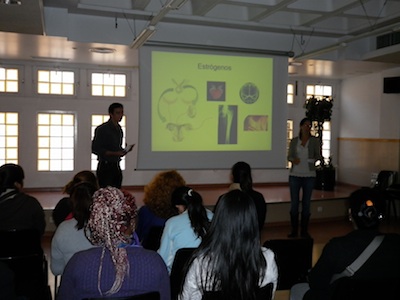
Every day more women can become mothers due to egg donation
(15-04-2011)
According to Generalitat de Catalunya’s FIVCAT 2008 official registry, almost half (43%) the embryos implanted in reproduction treatments come from egg donations. This percentage increases by the day, since women in developed countries decide to become mothers at a stage in their lives in which their eggs have already aged. Therefore they need a younger woman’s eggs to achieve pregnancy.
Young mothers gain more weight and look after themselves less
(14-04-2011)
University of Minnesota found in a recent study that young mothers tend to relax their dietary and exercise habits much more than those over 30. Study published.
This statement has been verified at our Obstetrics consultations at Institut Marquès. Many women, especially younger ones, continue to believe pregnancy is a free pass to gaining weight, satisfying all whims which will destabilize their diet, and stop exercising. Thus, their weight increases exaggeratedly and their muscles lose shape during a few crucial months. This isn’t as frequent in 40-year-old women, who are more conscious about the effort looking after oneself requires and are more aware that their attitude and life habits are factors that can improve their pregnancy. For that reason, they take better account of their gynecologist’s advice.
“It’s precisely during these months that diet has to be better balanced and physical activity more regular in order to prevent diabetes, back aches and overweight. Eating for both yourself and your baby is no longer acceptable, since it isn’t about doubling quantity but quality” says Dr. Alex Garcia Faura.
How do our embryologists work
The embryo is our little patient at the Assisted Reproduction laboratory and it must be treated with care. Since it mustn’t be affected by temperature, light, or environmental variations, our biologists practically work in the dark. They aren’t allowed to use cosmetics or perfumes and neither can they wear jewelry nor watches, since all these could bring pollutants into the room.
The air’s pureness is maintained by a complex active carbon system, positive pressure that forces any possible impurity out, and special walls and floors that discharge static electricity. Additionally, our laboratory has a set of anti-vibratory hydraulic tables that guarantees the preciseness in movements required for the meticulous and delicate tasks our embryologists carry out.
Four out of every ten women who undergo a reproduction treatment in Catalonia come from abroad
(11-04-2011)
According to Generalitat de Catalunya’s FIVCAT 2008 official register, 38,7% of the women who undergo an assisted reproduction treatment in Catalonia come from abroad. Nevertheless, in internationally referenced centers such as Institut Marquès, up to 7 out of every 10 patients come from other countries. These patients usually are couples who have spent up to 18 years trying to conceive and who come to our center with a last hope of achieving pregnancy.
Single women: another path to motherhood
Being a single mother is becoming an every day more popular choice between women. Women without a masculine couple turn to assisted reproduction to become mothers, since spanish law, grants acces to fertility treatments without consideration of her civil status or sexual orientation. Last February 22nd, Dr. Braulio Peramo, Head of Reproduction of Instituto Marquès, conducted a conference in which he explained that 1 of every 5 fertility treatments are carried out for women without a masculine couple: Insemination, IVF with or without donor eggs, and embryo adoption, depending on each woman’s characteristics and with better results progressively achieved.
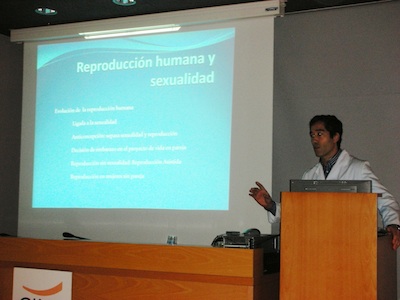
Peramo
Analysis of all embryo chromosomes in women over 40 allows doubling their chances of pregnancy. (6-1-2011)
70% of British women that travel to Barcelona to become mothers are over 40 years of age and because of their age, special assisted reproductive techniques are required in order for these couples to have a healthy baby. According to the study, “Improved pregnancy rates in advanced maternal age” that Institut Marquès and the Centre for Embryo Medicine present at the Fertility 2011 Congress in Dublin, Preimplantational Genetic Diagnosis (PGD) for all embryo chromosomes using a novel FISH technique developed at Institut Marques allows increasing pregnancy rates in these couples from 22.2 to 58.3 %. “For the first time, using this new FISH we can now analyze the complete human karyotype before the embryo is transferred, opening the door for future pregnancies in couples that up to now had little or no chances of becoming parents”, says Dr. Esther Velilla, Lab Director of Institut Marquès. Irish Times
About PGD at the IFFS conference in Munich 2010
The IVF medical team of Instituto Marques presented a study at the International Federation of Fertility & Infertility conference that took place in October 2010 in Munich. The study emphasizes the benefits of using PGD with couples that are at risk for having children affected by chromosomal syndromes related to advanced maternal age, repeated miscarriages or genetically anomalous sperm.
This study was based on the revision of medical records of patients who realized In Vitro Fertilisation after utilizing Preimplantational Genetic Diagnostics. The biologists found that if this technique had not been applied to select cromosomally healthy embryos, the possibility of transfering an embryo with chromosomal anomolies would have been nearly fifty percent. This is attributed to the fact that half of the embryos which initially appeared to be appropriate candidates for transfer, actually contained chromosomal alterations.
36% of British couples that had a baby after In Vitro Fertilisation treatment cycles cannot make a decision about what to do with their leftover frozen embryos
When the progenitors do not make a decision, the embryos will be under the custody of the medical team of the center that will assign them to other couples that desire to have a baby. The Embryo Adoption Program of Institut Marques has allowed women from 24 different countries to become mothers. To date, 468 babies have been born thanks to this worldwide pioneering initiative.
Testicular puncture, essential to detect the origin of infertility
More than the half (61%) of the analyzed couples with repeated IVF failures without any apparent cause have a meiosis problem that can be detected through a testicular biopsy in order to relead the treatment to the pregnancy.The IVF outcome in couples with meiotic anomalies in testicular biopsy study presented in the European Society of Human Reproduction and Embriology (ESHRE) congress, by the Andrology team of Institut Marqués, was implemented by analyzing 321 couples with repeated IVF failures.
In order to improve the pregnancy options in such a case, a meiosis problem, specialists advise to analyze the resulting embryos obtained during an IVF Fertilisation with the husband’s semen, before implanting them, so that only the chromosomical healthy ones are transferred. With this technique, known as Preimplantation Genetic Diagnosis, and according to the same study, the pregnancy rate reaches the 50%. Other possibility is to use donor semen –in the more pathological cases.
We talk about male infertility at the congress of Gynaecological Investigation in Saint Petersburg
Our team, represented by Prof. Juan Alvarez and Dr. Cristina Guix give a speech about male factor and analysis of embryos at the congress of New Gynaecological Technologies organized by the Gynaecological Investigation Centre of the Russian Ministry of Health from 7th to 10th June in Saint Petersburg.
Institut Marques in the Alpha Conference 2010 for Reproduction Biology, hold in Hungary
Prof. Alvarez participated as a speaker in the international Alpha congress, hold in Budapest from the 30th of April to the 2nd of May with a speech dedicated to the latest progress in semen cryopreservation and molecular markers for the post-freezing damages. To the Alpha conference have been invited as speakers the leaders in the field of Reproduction Biology.
Scientific director of the Institut Marques, co-author of the new Practical Guide to Andrology Laboratory
Our scientific director, Prof. Juan G. Alvarez is one of the authors of the new Andrology handbook, A Practical guide to Andrology Laboratory written by the present leaders of reproductive Biology, coming from such outstanding institutions as University Hospital Karolinska, University of Oslo and the Tygerberg Hospital in South Africa. This handbook contains all the aspects related to the semen analysis and semen function and establishes as well the recommendations for the criteria of semen quality.
Last article published in the medical journey Fertilty&Infertility
In a study recently published in Fertility & Infertility, Dr. Juan G. Alvarez, Professor of Harvard Medical School and Scientific Director of Institut Marquès, together with Dr. Sakkas, Professor of Yale University, underscore the importance of the use of testicular sperm with intact DNA in the treatment of infertility couples that have been trying to obtain a pregnancy for many years using assisted reproductive techniques and have not been successful.
Training course for our young Biologists
In order to improve training in the field of Reproduction Medicine, the Instituto Marques is giving trainee ships to students of Biology or Biologists doing Masters on Cellular Biology or Biomedicine. This trainee ship has been developed in cooperation with the Universitat Autònoma de Barcelona, the Universitat de Barcelona and the Universitat Pompeu Fabra. Consequently the students have the opportunity to enhance their knowledge and obtain first-hand information regarding the latest and most innovative Techniques of Assisted Human Reproduction in our IVF, PGD and Andrology laboratories.
Instituto Marques advertises the spinal cord donation among it’s egg cell donors
Within it’s Corporative Social Responsibility Programme (Programa de Responsabilidad Social Corporativa) Instituto Marques cooperates with the Internationl Josep Carreras Foundation (Fundación Internacional Josep Carreras) against leukemia (www.fcarreras.org). A disease which causes only in Spain every year 4000 new cases of illness. Lot’s of these patients, especially the young ones can only survive with a spinal cord transplant. For this reason and considering that our egg cell donors are young and especially altruistic and solidarity, we launched an information campaign inviting them to become a spinal cord donor as well.
“A test tube stork,” the book in which our patients Raffina and Bertrando explain how their children were born
“A test tube stork,” the book in which our patients Raffina and Bertrando explain how their children were born
Raffina and Bertrando is one couple among a thousand that we helped to become parents. They wrote a story to tell their twins how they were born thanks to a very special gift: sperm donation. Dr. Olivares, their doctor, is one of the characters in this “love story”, according to the authors.
For further information about the book: http://www.uni-service.it/una-cicogna-provetta.html

cicogna provetta
Sexuality workshops for teenagers
Sexuality workshops for teenagers, organised by Institut Marquès, are held in several schools in Barcelona. In these sessions, addressed to High School students, our gynaecologists inform and educate so that youth assume a positive attitude concerning their sexuality and a responsible sexual behaviour in order to avoid sexual transmitted diseases and unwanted pregnancies.

teenagers sexuality
Assisted Reproduction faces new family models
In November 2009, Dr. Marisa López-Teijón, the Assisted Reproduction Service Director of Institut Marquès, gave a lecture about new family models evolution and its reflection on Assisted Reproduction, within the V Assisted Reproduction Symposium framework organised by the Assisted Reproduction Institute of Galicia (IRAGA) and La Rosaleda, Assisted Reproduction Unit.
Conference of Prof. Alvarez about the masculine factor during the Irish Fertility Society Annual Scientific Meeting
Our scientific director will act as keynote speaker during the meeting in May 2009 in Galway (Ireland) with a session dedicated to the genomic masculine factor and it’s importance regarding diagnosis and treatment in couples with repeated failures in IVF and infertility of long development.
Our experience regarding Preimplantation Genetic Diagnosis, at Miami’s Congress “PGDis”
The biologist of Institut Marquès/Centro de Medicina Embrionaria joined the congress “PGDis”, held in Miami, April 22nd-April 25th.
Dr. Esther Velilla and Dr Silvia Fernandez talked about the advantages of PGD to study male infertility and discussed how to achieve a better selection of oocytes in egg donation by the new technique of the polar body biopsy.
Institut Marquès, at the Bulgarian Tenth Annual Meeting of Infertility
Our Scientific Director, Prof. Juan G. Alvarez, will give a conference about genomic male factor at the Tenth Annual Meeting of Infertility, Contraception, Hormone Replacement Therapy and Gynecological Endoscopy, organized by the Bulgarian Association of Infertility and Reproductive Health (BASRH). The title of the conference is “Importance of sperm DNA fragmentation testing in the diagnosis and treatment of infertility“.
Research on semen thawing published in “Fertility Infertility”
The thawing temperature can become a decisive factor for the final quality of the spermatozoa. According to the scientific research “Effect of thawing temperature on the motility recovery of cryopreserved human spermatozoa” carried out by the Department of Reproductive Biology of the Institute Marquès along with other international research teams, thawing the semen samples at 40ºC (and not at 37ºC) allows us to recover a larger quantity of mobile spermatozoids (up to 40% more).
The research work has been carried out in collaboration with the Center of Research on Reproduction of the University of Pennsylvania, the Jones Institute for Reproductive Medicine of Virginia Medical School, “Seremas” Medical Centre in Buenos Aires and the Laboratory of Reproduction Studies in Buenos Aires.
The discovery is of special interest for the therapy of artificial insemination because it allows us to recover a larger quantity of mobile spermatozoids, and thus to carry out the insemination in optimum conditions.
Latest investigations regarding male factors presented at the International Congress of Andrology
In March 2009 Barcelona hosted the International Congress of Andrology, where we presented our scientific studies about the genetic factors in men (FISH, MEIOSIS and DNA Fragmentation). Our Scientific Director Dr. Juan G. Álvarez, a leading world specialist in male factor studies, attended the session.
The International team of the Institute Marquès takes part in a meeting of the Scottish patients of “Cradle”
Dr. Raul Olivares and Dr. Victoria Walker took part in a meeting organized by “Cradle” – a Scottish charity that provides support to individuals and couples experiencing infertility – in February of 2009. During the meeting that took place in Glasgow our specialists presented the latest advancements in the field of infertility treatment, paying special attention at the genetic study of masculine infertility, and responded to the questions of the audience about various aspects of Assisted Reproduction.
Embryo donation research
Institut Marquès took part in the comparative study on embryo donation carried out by the National Embryo Donation Centre in eight countries. The work was presented at the congress of the American Society of Reproductive Medicine that took place in San Francisco in November of 2008.
Popularization of Science in Africa regarding Assisted Reproduction Techniques
According to our program of Corporate Social Responsability, Institut Marquès cooperates with Hospital Provita of Ghana providing technical information regarding Assisted Reproduction Techniques.
New non invasive technology to identify high- quality gametes and embryos
Thanks to our collaboration with Dr. Lev Perelman, Professor of Harvard Medical School and former Professor of the Massachusetts Institute of Technology, Institute Marquès is currently working on implementing a new cutting-edge technology, known as Confocal Light Absorption Scattering Spectroscopy. This technology allows to differentiate sperm with fragmented DNA from sperm with non-fragmented DNA and, therefore, can be utilized to select sperm with intact DNA and improve pregnancy rates in assisted reproductive technologies. In addition, this technology can be also applied to the non-invasive Preimplantation Genetic Diagnosis and the selection of embryos with a normal complement of chromosomes. That is, to identify and select the healthy embryos thus bypassing the need to perform an embryo biopsy.
Instituto Marquès participates in the Fertility Congress from Bulgaria
Dr. Raul Olivares,International Program Director at the Instituto Marquès, together with other prestigious professionals from several countries, was invited to address the National Congress of the Fertility Society of Bulgaria, held in April in Varna. In his discourse he explained the latest techniques for poor prognosis patients, for example male genetic factors, PGD, stimulation protocols and new tests for implantation studies.
Prof. J. G. Alvarez, guest of honor in the VII Andrology and Gametology Congress of Santiago de Chile
Our scientific director gave two lectures at this congress: one on diagnostic techniques to identify the best spermatozoids for ICSI and the second on clinical applications of the study of spermatic DNA fragmentation in the diagnosis and treatment of infertility in couples. During his visit he contacted with a group of Reproductive Biology students whose PH.D thesis he is directing and was interviewed by Chile National Television.
Scientific exchange with Universidad de la Frontera de Chile, pioneer in spermatozoid vitrification
At the beginning of 2008 we started a new scientific programme with Universidad de La Frontera, in Temuco, Chile, for the development of the spermatozoid vitrification technique. With this new method, which hadn’t been carried out until now, we want to optimize the cryopreservation of the spermatozoids in all the cases that require freezing, therefore avoiding damage of the DNA of the spermatozoids during the unfreezing process and improving the pregnancy rates.
Institut Marquès at the forefront of reproductive biology
We started 2008 with a new scientific objective aimed at improving the pregnancy rates: On the one hand, preventing embrionary multinculeation (embryo with more than one nucleus in one of its cells) and on the other hand, trying to achieve pregnancy with multinucleic embryos of good prognosis which until now were discarded… This advance has been possible thanks to our recent collaboration with Dr. Vanessa Rawe, worldscale opinion leader of embrionary multinucleation, intracelular traffic, ultrastructure of microtubulus and spermatic centrioles and in oocyte proteasomes. With it we begin a new line of research on oocyte vitrification and improvement of pregnancy rates with embryos derived from these.
Dr. Vanessas Rawe with Dr. Jesus del Mazo, professor of the Biological Research Centre of the CSIC.
Teaching European specialists about the male factor
Professor J.G. Álvarez, scientific director of Institut Marquès, attended the scientific conference of the Campus Course of ESHRE (European Association of Human Reproduction) December 2007 in Brussels, where he taught European specialists in the study of the male factor. Institut Marquès is a pioneer in the application of these techniques, which are still yet unknown in many countries (study of meiosis, FISH test in sperm and DNA fragmentation test. These tests can help to explain why previous pregnancy attempts have failed and thanks to these, many couples have now become parents through our clinic after not being successful in other centres around the world.
New method to select the best spermatozoas
With the collaboration of Professor Uwe Paash from the University of Leipzig, we are developing a new technique (columns of Annexin V) to select the best genomical sperms. This will therefore enable us to create embryos of a superior quality and therefore increase the possibilities of a successful pregnancy.
Institut Marquès and ‘Human Reproduction’
An article which expresses the opinion of our Scientific Director Profesor J.G Alvarez has been published in the prestigious journal ´Human Reproduction’. This will be found under the title ‘The levels of DNA fragmentation in spermatozoas measured with the SCSA test after using gradient centrifugation, are not predictive of the outcome of assisted reproduction.‘ This article establishes the best methods to detect the real cause of why many treatments are not successful : The fragmentation of DNA. Read more
Institut Marquès certifies its quality with the ISO 9001
As recognition to our interest in offering patients an excellent service, Institut Marquès has received the ISO 9001 quality certification. This norm guarantees that all our procedures are directed to provide a high quality service following the principles of continuous improvement, leadership, a high envolvement of all the administrative and sanitary staff and an organisation which is patient-focused.

